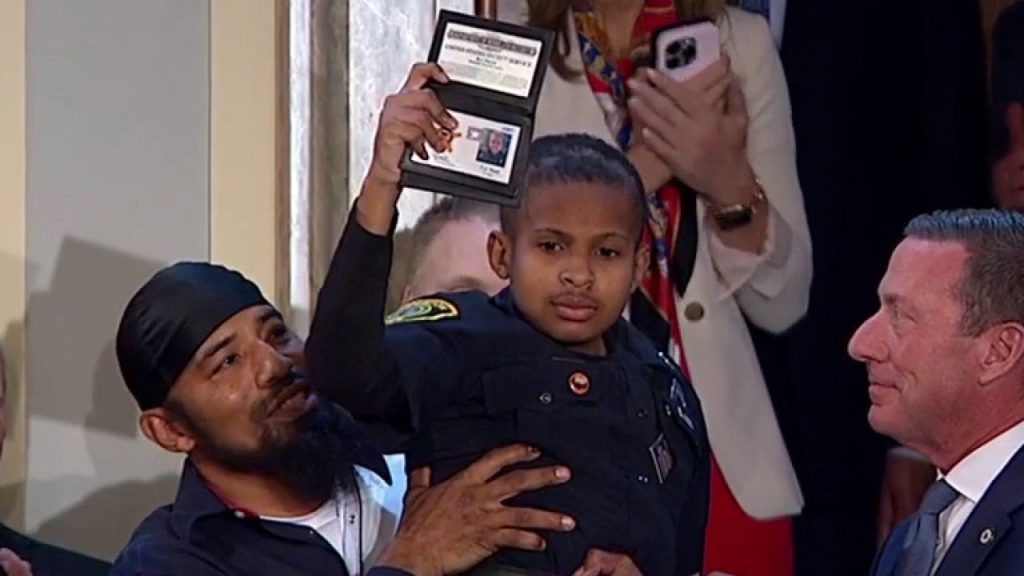During a highly publicized speech by former President Donald Trump, a moment involving a 13-year-old brain cancer survivor, DJ Daniel, stirred controversy when several members of the Democratic Party reportedly chose not to applaud or stand as he was honored. This incident rapidly became a point of contention on social media, leading to various reactions from political figures and analysts. As the nation continues to grapple with polarized sentiments, this episode highlights the ongoing rift between party lines and public perception of support for vulnerable populations.
| Article Subheadings |
|---|
| 1) A Special Honor for DJ Daniel |
| 2) Reactions from Social Media |
| 3) The Broader Political Context |
| 4) Responses from Democratic Leaders |
| 5) The Significance of Applause |
A Special Honor for DJ Daniel
During a joint session of Congress on March 4, 2025, former President Donald Trump recognized DJ Daniel, a 13-year-old boy who has bravely battled brain cancer. In a poignant moment, Trump awarded Daniel an honorary Secret Service badge, highlighting the young survivor’s courage and resilience in the face of adversity. This gesture not only aimed to celebrate DJ’s triumph over illness but also to inspire others who may be facing similar challenges. The ceremony, meant to be uplifting, reflected a significant personal achievement for Daniel and sought to draw attention to the struggles of pediatric cancer patients.
Reactions from Social Media
In the aftermath of the event, reactions flooded social media platforms, particularly X (formerly Twitter), where many users expressed outrage regarding the perceived lack of support from Democratic representatives. Prominent figures, such as former Trump administration official Ric Grennell, criticized Democrats for not standing or applauding for the young cancer survivor during such a meaningful presentation. Other users echoed these sentiments, labeling the actions as “awful” and branding the Democrats as “sick” for their apparent indifference. Politicians and commentators shared their disbelief and condemnation, augmenting the ongoing debate about partisanship in political expressions of unity and support.
The Broader Political Context
This incident did not occur in isolation but rather in a charged political atmosphere. The speech was characterized by planned protests from some Democratic lawmakers, illustrating the deep divisions within Congress. Prior to Trump’s address, tensions were palpable, culminating in the removal of Democratic Representative Al Green after he disrupted the speech. Moreover, representatives like Jasmine Crockett and Senator Bernie Sanders exited the session early. These actions brought additional scrutiny and raised questions about the respect afforded to moments intended for national healing and unity, particularly those involving children and their battles with illness.
Responses from Democratic Leaders
The backlash prompted responses from Democrats, who argued that the audience’s complexity should not be simplified to mere applause. They emphasized that their dissent was rooted in broader political disagreements rather than personal attacks against DJ Daniel or his achievements. Some Democratic leaders, recognizing the media storm that ensued, attempted to pivot the narrative. They shared messages about their commitment to addressing pediatric cancer and healthcare issues, insisting that applause is not a substitute for meaningful policy proposals and advocacy. This observation underscores that political engagement can often overshadow individual stories that should garner collective support.
The Significance of Applause
The applause – or lack thereof – during moments like these invites substantial debate about the role of genuine bipartisan support. For many, failing to acknowledge a young cancer survivor in such a manner appears to symbolize deeper issues within political discourse, including the tendency for personal narratives to become weapons in political battles. Supporters of DJ Daniel’s recognition suggested that clapping for a child suffering from a serious illness should transcend party lines, serving as a reminder of shared humanity amid fierce division. The event calls into question whether such expressions can exist outside the realm of partisan clashes.
| No. | Key Points |
|---|---|
| 1 | The commendation for DJ Daniel highlighted his courageous battle against brain cancer. |
| 2 | Public response on social media criticized Democrats for not applauding the young survivor. |
| 3 | The incident reflects ongoing political divisions and the impact of partisanship on civil moments. |
| 4 | Democratic leaders defended their actions, stating it was a matter of policy disagreement. |
| 5 | The lack of applause raises questions about bipartisan support for issues involving children and health. |
Summary
The incident featuring DJ Daniel poignantly underscores the intersection of personal stories and political narratives. Despite the intentions behind the recognition of a young brain cancer survivor, the polarized reactions reveal the ongoing challenges in achieving bipartisan respect and understanding. This moment serves as a reminder of the need for compassionate discourse amidst divisive politics, urging lawmakers and the public alike to prioritize humanity above partisan loyalty.
Frequently Asked Questions
Question: Why was DJ Daniel honored during Trump’s speech?
DJ Daniel was recognized for his courage in battling brain cancer, symbolizing hope for other children facing similar challenges.
Question: What was the reaction from social media regarding the Democrats’ actions?
Many users expressed anger and disappointment on social media, suggesting that the Democratic Party’s lack of applause for DJ Daniel reflected poorly on their values.
Question: What broader political tensions were evident during this event?
The event showcased significant partisan divisions, with some Democrats protesting during Trump’s speech and even resulting in the removal of a congressman for disruption.


